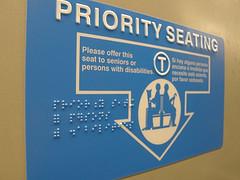Transit Etiquette
I will never forget a day in high school when I was sitting on a crowded bus, headed home, and the lady in front of me, who was not old or pregnant, had what looked to me to be a pained expression on her face. I wondered if maybe her legs hurt as the vehicle lurched around, but I was a shy kid scared to offer her my seat in case really I had just totally misread the situation. After a while the crowd eased and the woman took a seat near me with obvious relief. I had failed on that day to give my seat to someone in need, and ever since I have made an effort not to repeat that mistake by paying greater attention to my fellow passengers.
I still ride transit most weekdays, and I have noticed especially that younger people tend to fail at the whole courtesy thing. Part of it may be self-involved rudeness, but part of it I think is a combination of shyness, and a fear of making contact with strangers in a public place. My generation was raised on the lessons that the world outside our homes is extremely violent and treacherous and that the most dangerous thing a child could ever ever do is to talk to a stranger. I like to think that with time most people grow out of their shells and feel more comfortable taking the initiative for social responsibility.
My own strategy is that if I see a person who might better deserve my seat, I try to make eye contact, at which point I start to get out of my chair. Then they either move forward or gesture for me to sit down. (It is better to err on the side of getting someone a seat. Also, I think people looking for a seat know to look others in the eye.) In other cases if the vehicle is crowded and eye contact can not be achieved, I’ll often just stand the heck up anyway, positioning myself in such a way that the person who could best use my seat finds it most accessible. (I would hate for a young punk to ignorantly snipe my seat.)
Here is some good reading from The Washington Post:
Social scientists say commuters are so goal-oriented that they tune everything else out. That might be a way for people to “protect their own integrity” from too much outside stimuli, said Arline Bronzaft, a retired psychology professor at the City University of New York and a former consultant to New York City transit.
People are also more rude today, said P.M. Forni, a Johns Hopkins University professor and author of two books on civility. Established forms of deference and respect, including giving up seats, have declined. That’s especially true in anonymous environments, such as the subway, he said. “In generations gone by, we had a strong incentive to behave in public in ways to conform to social norms,” he said. “If we didn’t, there was shame.”
Not anymore.
Multiple generations have grown up with the message that they, not others, are the most important people in the world, Forni said. “If I’m the most important person in the world, why should I give my seat on the bus to anybody else?” he said.
El Paso passed a law that made it a misdemeanor, punishable with fines up to $500, for an able-bodied person younger than 65 to deny a seat to senior or disabled passengers in specifically marked areas of local buses. Since November, when it became law, no one’s been cited by police. “A couple” of disputes have occurred, but on the whole, “people have been a little nicer,” said Lloyd Williams, a bus operations official.
The other day I was riding the subway and I stood next to an elderly lady in a cramped subway car. As the train began to empty I stood further away, and I could tell she was looking for a seat. As she gripped the hand rails she would look in turn at each person in the seats near her. Nada. She didn’t look at me but I kind of hoped she would, because a part of me wanted to loudly announce, “ma’am, if I had a seat it would be my honor to give it to you.”
Next time I hope to have the balls to ask the lady if she could use a seat, and then ask a seated passenger if they are able-bodied, and if so could they give their seat to a senior citizen. There is an element of shame that we are missing, and only a genuine asshole wants to be politely asked by a stranger to give up their seat a second time. (I did recently speak up to direct a blind passenger to a nearby seat, so I’m not that shy.)


Comment
Tiny Print:
<a href="" title=""> <abbr title=""> <acronym title=""> <b> <blockquote cite=""> <cite> <code> <del datetime=""> <em> <i> <q cite=""> <s> <strike> <strong>